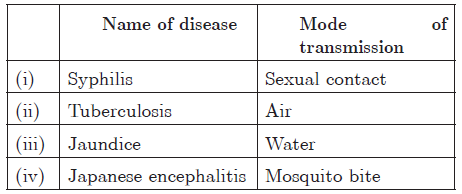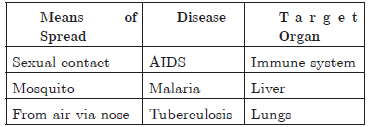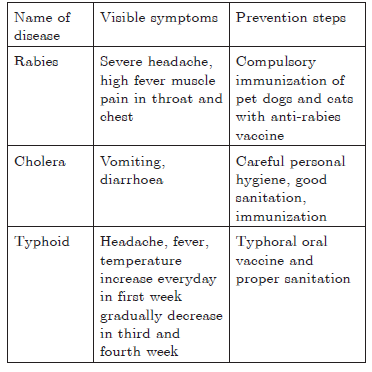Students should practice questions given in Why Do We Fall ill Chapter 13 Class 9 Science Worksheets. These worksheets for Class 9 Science have a good collection of important questions and answers which are expected to come in your class tests and examinations. You should learn these solved worksheet questions for Science Class 9 as it will help you to understand all topics and give you more marks.
Class 9 Science Worksheets Chapter 13 Why Do We Fall ill
Please refer to below questions and answers for Why Do We Fall ill Chapter 13 Class 9 Science Worksheets. Prepared by expert teachers for Standard 9 Science
Question. Why is AIDS a fatal disease?
Answer
In AIDS, immune system of the body is highly weakened and body suffers from severe infections which lead to death of the individual. Hence, it is a fatal disease.
Question. Common cold spreads faster and is difficult to control.Give reason.
Answer
Common cold is a communicable and air borne disease, i.e., the microbes spread through the air.
Thus, common cold spreads faster and is difficult to control.
Question. Name the pathogens which can cause acne and sleeping sickness.
Answer
Acne – Staphylococci.
Sleeping sickness – Trypanosoma.
Question. What is the work of vaccination?
Answer
Vaccination is to grow the production of specific antibodies to confer immunity against subsequent infection.
Question. Name the microorganism causing elephantiasis.
Answer
Worms.
Question. What is an epidemic disease? Which organ is affected if a person is suffering from jaundice?
Answer
An epidemic is the rapid and extensive spread of disease that affects many individuals simultaneously in a particular area. It is generally an infectious disease. Liver is affected if the person is suffering from jaundice.
Question. Name any two diseases which are caused due to unprotected sexual intercourse.
Answer
(i) AIDS, (ii) Syphilis.
Question. Why is making of anti-viral drugs more difficult than making anti-bacterial medicines?
Answer
Because viruses have very few biochemical mechanism of their own.
Question. A child goes to a party and come back with cough, running nose, headache and fever. What could be the possible disease? Name the pathogen causing it.
Answer
It could be influenza caused by the virus.
Question. How can we prevent water borne and vector borne infections?
Answer
(i) Water borne infections can be prevented by providing safe drinking water.
(ii) Vector borne infections can be prevented by providing clean environment.
Question. Name any four diseases transmitted through vectors.
Answer
Malaria, Dengue, Kala-azar and Plague.
Question. Give any four essential factors that must be taken care of by an individual for keeping good health.
Answer
(i) Balanced diet.
(ii) Healthy environment.
(iii) Personal hygiene.
(iv) Mental and social stability.
Question. How do we know that someone is suffering from disease?
Answer
Signs and symptoms indicate presence of a particular disease. Because when there is a disease, either the functioning or the appearance of one or more systems of the body will change for the worse.
Question. Give four modes of transmission of AIDS.
Answer
(i) Transfusion of blood.
(ii) From an infected mother to her unborn baby during pregnancy.
(iii) At the time of breast feeding.
(iv) Sexual contact.
Question. What causes Japanese encephalitis? How it can be prevented?
Answer
(i) Japanese encephalitis is caused by virus which enters into human body through mosquito bite.
(ii) By keeping the surrounding clean and taking proper measures against mosquito bite, it can be prevented.
Question. Write the expanded form of AIDS.
Answer
Acquired Immuno Deficiency Syndrome.
Question. What are non-communicable diseases? Give examples.
Answer
Those diseases which cannot be spread from person to person, e.g., Diabetes, Cancer, etc.
Question. Why is Vaccination of children necessary?
Answer
Children are more vulnerable and susceptible to diseases and are hence given vaccines so they are able to develop immunity against diseases.
Question. State conditions essential for good health.
Answer
Health is a state of being well enough to function well physically, mentally and socially. The health of any individual depends upon :
(i) Better social environment.
(ii) Better public cleanliness.
(iii) Good economic conditions.
(iv) Social equality and harmony.
Question. Give the modes of transmission of each of the following diseases :
(i) Syphilis (ii) Tuberculosis (iii) Jaundice
(iv) Japanese encephalitis
Answer

Question. Why do female anopheles mosquito feed on human blood?
Answer
They need nutritious food in the form of blood in order to be able to lay mature eggs.
Question. Why are we normally advised, to take bland and nourishing food when we are sick?
Answer
Normal body functions get disturbed during disease.In such a case, nutritious and easily digestible food is good for fast recovery. Thus, bland and nourishing food is required during sickness.
Question. What are the symptoms shown by a person if :
(i) Lungs get infected
(ii) Stomach is infected
Answer
(i) Cough and breathlessness.
(ii) Stomach ache, loose motion, vomiting.
Question. Give four modes of transmission of AIDS.
Answer.
(i) Blood to blood contact (transfusion).
(ii) From an infected mother to her unborn baby during pregnancy, labour or delivery.
(iii) Through breast feeding.
Question. Write a short note on vaccination.
Answer. Vaccination is based on the principle that our body learns to fight against a certain microbe when the microbe attacks our body for the first time. Vaccines are made from dead or weak strains of a microbe.Vaccine is inoculated in the body in appropriate dose. After vaccination, the body learns to fight with that microbe. As a result the body fight back strongly to prevent disease.
Question. Give difference between acquired disease and congenital disease.
Answer.

Question. (i) Why a person suffering from AIDS cannot fight even small infections?
(ii) In a slum area, many people are suffering from malaria. Mention any two unhygienic conditions that must be prevailing in that locality.
(iii) Why female Anopheles mosquito feeds on human blood?
Answer.
(i) AIDS is caused by HIV which damages the immune system of the person suffering from it. Thus, the person cannot fight even small infections.
(ii) Stagnant water in the surroundings and accumulation of garbage.
(iii) Because Female Anopheles mosquitoes require large amount of proteins to lay their eggs.
Question. State two principles of treatment of a disease. Name the approaches generally adopted to treat infectious diseases.
Answer. There are two ways to treat an infectious disease :
(i) Reducing the effect of the disease.
(ii) Killing the microorganisms that act as infectious agents.
There is two approaches to treat the infectious diseases. These are :
(a) To reduce the effects of the disease.
(b) To eliminate or kill the cause of the disease.
Question. (i) List any three reasons why you would think that you are sick and ought to see a doctor.
(ii) If only one of these symptoms were present, would you still go to the doctor? Why or why not?
Answer.
(i) When there is a disease, body will change for the worse. This gives rise to symptoms and signs of disease. Symptoms of disease indicate that a person is not well. These symptoms can be in the form of headache, cough and loose motions. These symptoms indicate the presence of disease but never mention the name of disease.
(ii) It is advisable to go to the doctor, even if you have any of these symptoms, because only doctor can diagnose about any signs of a disease on the basis of these symptoms. But if there is only one symptom of headache, then there is no need of visiting a doctor because it could be due to tiredness or stress.
Question. What are limitations for the approach to deal with infectious diseases?
Answer. Three limitations are :
(i) If someone is suffering from disease, his body function will disturb.
(ii) Treatment will take time.
(iii) Infectious person can be a source of spreading infection.
Question. Give difference between Kwashiorkor and Marasmus.
Answer.


Question. What do you mean by immune response?
Answer. Immune response is the reaction of the body’s immune system to foreign cells or substances that cause disease or may even be potentially dangerous. This response involves the production of cells (lymphocytes) and chemicals (antibodies) designed to defend the body against the pathogen.
Question. Why is immune system essential for our health?
Answer. The immune system of our body is a type of defence mechanism to fight against pathogenic microbes. It has cells that are specialized to kill infecting microbes and keep our body healthy.
Question. Give difference between Congenital Diseases and Acquired Diseases.
Answer. Congenital :
(i) These occur since from birth.
(ii) Inherited from the parents to the offspring.
Acquired :
(i) It occurs during the lifetime of the person and not from the birth.
(ii) It does not get inherited. It occurs due to pathogens or due to deficiency of nutrients, hormonal imbalance or due to degeneration of the tissues.
Question. Name the diseases which’ are caused by :
Answer. Bacteria : TB, Typhoid, Anthrax and Tetanus.
Viruses : Common Cold, AIDS, Dengue fever and Mumps.
Fungi : Ring worm, Skin infections and Athlete’s foot.
Protozoa : Malaria, Kala-Azar, Sleeping Sickness and Amoebiasis.
Question. Name the organs which are targeted by specific diseases.
Answer.
(i) Hepatitis : Liver
(ii) Fungal diseases : Skin
(iii) Pneumonia : Lungs
(iv) TB : lungs
(v) Diarrhoea : Intestines.
Question. Identify the diseases which spread through the following :
(i) Sexual contact
(ii) Mosquito
(iii) From air via nose
Also name the target organ.
Answer.

Question. Name five diseases against which immunization vaccine are available.
Answer. Five diseases against which immunization vaccines are available :
(i) Tetanus
(ii) Diphtheria
(iii) Whooping cough
(iv) Polio
(v) Measles
Question. What is inflammation? What are the symptoms and sign of inflammation?
Answer. It is the recruitment process by immune system in which immune system recruits many cells to the affected tissue to kill the disease causing germs. During this process, certain local effects such as swelling and pain and general effects such as fever may develop.
Question. Define carriers. Give two examples.
Answer. Carriers are the organisms which harbor diseasecausing germs without showing away sign of disease themselves, but have the ability to infect other healthy individuals.
For example : Housefly, female insect Anopheles.
Question. The body of a patient has lost its power of fighting against infections. Which disease may the patient be suffering from? Name the pathogen and describe any two modes of its transmission from the patient to other person.
Answer. Patient is suffering from AIDS.
HIV (Human Immuno deficiency Virus) can be transmitted by :
(1) sexual contact with infected person.
(2) the use infected syringe.
Question. What is the various dimensions of health?
Answer. Various dimensions of health is :
(i) Physical dimensions : Physical health implies perfect functioning of all the organs and systems of the body.
(ii) Mental dimensions : Mental health implies a state of balance and harmony between the individual and surrounding world.
(iii) Social dimensions : A person is socially healthy if he has a good job, a good house, a happy family, good neighbours and understanding friends.
Question. What precautions can you take in your school to reduce the incidence of infectious diseases?
Answer. The following precautions can be taken in my school to reduce the incidence of infectious diseases :
(i) Isolation of infected students to prevent the spreading of air borne diseases.
(ii) Availability of clean drinking water.
(iii) Clean surroundings to stop the growth and multiplication of vectors.
(iv) Starting public health programme of childhood immunisation.
(v) Spreading awareness through lectures and seminars about prevention and health concept.
Question. State giving reasons whether the following statements are correct or not :
(i) Our surrounding area should be free from stagnant water.
(ii) Staying clean is not necessary as long as you eat a balanced diet.
(iii) Social equality and harmony are necessary for good health.
Answer.
(i) Yes, because stagnant water is the breeding place of mosquitoes which causes diseases like malaria, dengue, etc.
(ii) No, as balance diet is essential for a good health but hygiene is also important to remain disease free.
(iii) Yes, because health refers to a state of physical, mental and social well-being. Our social environment plays an important role in our individual health.
Question. Differentiate between communicable and noncommunicable diseases. Give one example of each.
Answer.

Question. Explain the following statements :
(a) Being disease free, is not the same as being healthy.
(b) Community health is essential for good individual health.
(c) Villagers suffer with cholera more than urban people.
Answer.
(a) Being disease free is not the same as being healthy because health means a state of physical, mental and social well-being. One should also be mentally and socially well to have a good health.
(b) Health of all organisms depend on their environment. So public cleanliness and good social environment are necessary for good individual health.
(c) Cholera is a water-borne disease, i.e., it spreads by contaminated water. Villagers suffer with cholera more than the urban people in the absence of pure drinking water.
Question. “On exposure with an infectious microbe does not necessarily mean developing noticeable disease.” Do you agree? Explain with reason. If yes, how severe infections occur in our body?
Answer. Yes. I agree with the statement.
The severity of disease manifestations depends on the number of microbes in the body. If the number of microbes is very small, the disease manifestations may be minor or unnoticed. But if the number of the microbes is large, the disease can be severe enough to be life-threatening.
The immune system is also a major factor that determines the number of microbes surviving in the body. The cells of immune system go into action each time infecting microbes enter the body. If they are successful, we do not actually come down with any disease and the manifestation of the disease will be minor. However, if the immune system fails, severe infections occur in the body.
Question. (a) What is immunisation?
(b) Define immunity and vaccination.
(c) What type of diseases can be prevented through vaccination?
Answer.
(a) A process of injecting of vaccine into a healthy person in order to develop immunity against the disease is called immunisation.
(b) An ability of a body to diagnose, destroy and diminish external disease-causing agents is called immunity. This immunisation can be done by giving vaccine and thus, it is also known as vaccination.
(c) Smallpox, rabies, polio, diphtheria, chickenpox and hepatitis can be prevented through vaccination. It has been possible to cure smallpox by vaccination programmes.
Question. Conduct a survey in your neighbourhood to find out what the three most common diseases are. Suggest three steps that could be taken by your local authorities to bring down the incidence of these diseases.
Answer. After conducting a survey, I have found the following three most common diseases in my locality. Place of study : Delhi
